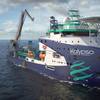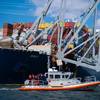A New Role for Service Providers Amidst Energy Upheaval
In today’s energy industry, things are moving fast. The upheaval brought about by COVID-19 and exacerbated by the Russia-Saudi Arabia oil price war has been so profound that the International Energy Agency (IEA) has described the situation as “a once in a century event for energy demand”. This is supported by current IEA predictions which suggest a 6% drop in global energy demand in 2020 – seven times worse than the plunge in demand that followed the 2008 recession.
Amid what the IEA has dubbed a “dismal” year for fossil fuels, the one bright spot is the performance of renewables sector, which is still expected to grow by 1% this year. That is a serious downgrade on the sector’s record performance last year, when global wind power capacity grew by almost a fifth. Nonetheless, the current modest growth figures for this year are fueling speculation that renewables will emerge as a new paradigm winner once the COVID-19 pandemic abates. If that happens, renewables will attract investment, drive growth, bring jobs and energy security in the future – all while supporting the global battle against climate change.
Confidence in the long-term future of renewables is further buoyed by the growing number of oil majors that have signed up to ambitious green targets. In the last month, for example, Shell has committed to a net-zero emissions goal by 2050, with CEO Ben van Beurden saying “society, and our customers, expect nothing less”.
The success of the renewables industry so far is supported by the progressive work done to date by companies including Shell, BP and Equinor to diversify into other means of power generation. As the global energy industry continues to navigate an era of unprecedented transition with renewables at its heart, the sector needs to be prepared to adapt and change.
As those who operate in the energy sector know, change has been a basic factor of the business over the last decade. Today, more than ever, the industry’s experts will be called upon to provide the resources and expertise necessary to help make sense of the new lay of the land after COVID-19.
-------------------------------------------------------------------------------------------
Join World Energy Report's Offshore Wind Webinar on June 17, 2020: https://zoom.us/webinar/register/WN_UR5uY1boTOKdAAcAXDbR4g
-------------------------------------------------------------------------------------------
Redeploying scarce resources
History teaches us that pandemics constrain what industries can do with the scarce resources at their disposal. Overcoming such constraints demands the highest levels of human ingenuity and effective use of the latest technologies. For offshore service providers, now is the time to take a clear and systematic view of all the issues – COVID-19 related and beyond – to take decisive action and update their approach as necessary and when further information is available.
While the current situation is singular, service providers are not in altogether uncharted waters. For years, they have managed heightened customer expectations, primarily motivated by a constant pursuit of cost reductions on the part of major operators. And for years, the response of the service providers has been a mantra of value adding; stretching to meet the demands of the market and remaining flexible to its ongoing change. This mantra must continue as service providers play their part in helping the market navigate the after-effects of the COVID-19 crisis.
The value of providers’ transferrable skills and knowledge is brought into sharp new focus. Their knowledge takes on new significance as a vital piece in the energy market’s COVID-19 response puzzle, particularly with respect to its persistent challenges of project management, knowledge bleed and technology.
Solving such perennial challenges helps make the overall shared response to the current market conditions more robust.
A faster pace of innovation
A knee-jerk reaction to the pandemic may be the assumption that a lack of resources will trigger the death of innovation within the sector. However, as we have seen, the demand for renewable electricity continues to grow, and the world has precious little time left to meet societal and regulatory pressures to decarbonize.
Some argue that COVID-19 may accelerate some of the innovations the energy market has already been adopting. Again, service providers find themselves at the cutting edge, driving and responding to increasing innovation within the markets they serve.
Data-driven decisions
In the same spirit, the value of data is likely to skyrocket. The previously observable shift from retrospective reporting to a requirement for real-time analytics will accelerate as cost concerns take centre stage once again.
As decisions are made about key projects, customers want in-depth insight into the exact cost and time taken for every job or development. Real-time analytics enable service providers to supply customers with the constant data that facilitates more informed decision-making and forecasting.
Critically, such insight requires both the service provider and the customer to have the digital infrastructure in place, heightening the requirement for innovation to continue, rather than stall.
Growing data utilization reveals that the costs of gathering this intelligence can be outweighed by the efficiency and operational benefits it brings, setting a challenge for every service provider to move in tandem, as data gains new prominence as an operational resource.
Human Capital in the Spotlight
By its very nature, the offshore economy has seen vast swathes of talent leave the sector as demand ebbs and flows. Sadly, the current economics will accelerate this trend further, leaving the market in an interesting position, particularly if we believe that there will be a continued uptick in renewable energy demand.
Historically, offshore energy projects have been hindered by organizations having to recruit and train individuals to successfully manage often complicated projects. This pressure is particularly heightened where projects have to navigate complex local regulatory and legal requirements, or are taking place in difficult environmental operating conditions.
Service providers will continue to fill this gap. Indeed, it could be argued that project management capabilities and market knowledge will be the defining factors of success both for providers, and the projects they work on, in the coming years.
Increasingly, contracts now stipulate a requirement for greater levels of knowledge sharing – at times including the outright secondment and embedding of experienced staff in a customer’s operations. As the offshore sector adjust to the new balance of oil & gas and renewables projects, the knowledge needed to manage the transition will have to come from somewhere. More than ever, operators will be looking externally for these answers.
Finding the Right Approach
The energy sector is facing some vast challenges. As it works to juggle ongoing issues such as project and data management, along with the wild card of COVID-19 and its economic impact, the market must not become blinkered in its response.
The right blend of human capital and data insights will take on new prominence. While every operator and service provider wishes they have a crystal ball to foresee the future of the market, we can instead build a robust and resilient approach that will allow us to be proactive.
As service providers take on new roles in the market, we must remember that change is a constant for this sector. Finding the right approach to navigate the challenges is a difficult task, but not unsurmountable. The same values that made for success in the last ten years will make for success in the next decade: collaboration, strong partnership and William Hill is the Executive Group Vice President – Oil & Gas for GAC. Hill joined the group in 1984 and has served in several senior leadership roles.
William Hill is the Executive Group Vice President – Oil & Gas for GAC. Hill joined the group in 1984 and has served in several senior leadership roles.

















